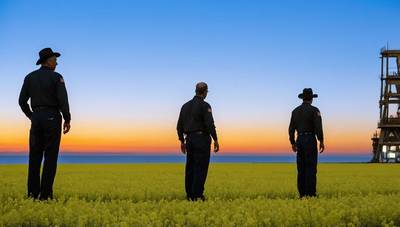Exxon and Hess will face off over Chevron's oilfield deal
Exxon Mobil, the top U.S. oil company, and Hess are scheduled to meet in court on Monday to decide whether Chevron will be able to complete its $53 billion purchase of Hess. This deal includes a stake in Guyana’s oilfields. This acquisition was announced in October of 2023 and is the largest deal in oil in recent years. Mike Wirth, CEO of Chevron, sees it as a key part of his strategy to improve the performance and profitability of the oil company. Exxon, and China's CNOOC (Hess's partners in Guyana) filed arbitration disputes at the beginning of last year. This delayed the closing of the deal and cost Chevron increased revenue and output.
Hess has a 30% stake in Exxon's Stabroek Block, located off the coasts of Guyana. Guyana, one of the fastest-growing oil producing countries in the world, is home to the Stabroek Block. It is estimated that the block contains more than 11 billion equivalent barrels of crude oil.
Exxon, CNOOC and others claim to have the contractual right of refusal in order to buy Hess' shareholdings in Guyana.
Chevron and Hess claim that the clause doesn't apply to the entire company. According to the contract, if they lose the arbitration, and cannot agree on a resolution acceptable to Exxon and CNOOC then the acquisition will fail. In a confidential hearing starting Monday in London, a three-member arbitral tribunal under the International Chamber of Commerce (ICC) will examine the dispute.
According to a source who is familiar with its terms, the joint operating agreement between Hess and Exxon in the Stabroek block, as well as CNOOC, is governed under UK law.
Four international arbitration lawyers who are familiar with ICC procedures say that by the time the hearing begins, Hess Exxon CNOOC will have submitted the majority of their testimony in writing. Hess' spokesperson pointed to an earlier filing in which the company stated that it expects to receive a decision following the hearings during the third quarter. An Exxon spokesperson referenced previous public statements about the case. Chevron, CNOOC and other companies did not respond when asked for comments.
Before the hearing, companies can submit written statements and documents from experts or witnesses they have called to support their claims.
William Kirtley said that this phase of arbitration is usually the longest, taking up to a year.
According to the annual report of the court, it takes an average ICC arbitral case over two years from the moment proceedings begin to resolve.
Hess Chevron, and Exxon expect to resolve their dispute in the third quarter this year. This would be around 18 months after Exxon, and CNOOC, initiated arbitration proceedings.
Kirtley stated that the ICC arbitration was relatively quick, particularly when you consider the size of the case.
It suggests that neither side is using delaying tactics in order to prolong the case."
WHAT TO EXPECT AT THE HEARING
Each party will make an opening statement before the arbitral tribunal on Monday.
Cross-examination of witnesses or experts who have already testified directly to the tribunal before the hearing.
The arbitrators may ask the experts and witnesses questions and interrogate each party's claims.
Three attorneys stated that hearings concerning large companies or disputes usually take place over a period of five days.
Hess Exxon CNOOC can choose to make a closing statement orally at the end of hearings. They may also submit a closing statement in writing.
Two attorneys stated that the arbitrators could provide a list with key questions or points for parties to address during their closing remarks.
WAITING GAME
After the tribunal closes the hearing, Hess Exxon CNOOC are not allowed to make any further arguments, unless the arbitrators have authorized it.
One of the attorneys said that two of the three arbitrators have to agree on the final ruling.
The ICC rules of arbitration require that the tribunal render a ruling within six months. However, four attorneys have said that this time frame can be extended and it is not always the case.
The tribunal will then send a draft of its decision to the ICC for approval.
The English Arbitration Act of 1997 allows parties to challenge arbitral decisions on certain grounds. These include serious irregularities and violations of due procedure. Kirtley noted that while parties often attempt to overturn awards, they are seldom successful. Sheila Dang, reporting from Houston; Simon Webb and Matthew Lewis, editing.
(source: Reuters)

